
Open Source for Global Excellence
November 8, 2024
In a world increasingly dominated by proprietary technologies and closed systems, open source represents something fundamentally different: a model of collaboration, transparency, and shared prosperity. At EarthKin, our commitment to open source isn't just about code—it's about building a more equitable, innovative, and sustainable digital future for everyone.
Open source embodies many of our core values: transparency over opacity, collaboration over competition, and community over individual gain. It represents a way of working that aligns with our belief that the best solutions emerge when diverse minds work together toward common goals.
What Open Source Means to Us
Open source is more than just making code publicly available. It's a philosophy and methodology that emphasizes:
Transparency: Open source projects operate in the open, with development processes, decision-making, and roadmaps visible to all. This transparency builds trust and enables better collaboration.
Collaboration: Open source brings together contributors from around the world, combining diverse perspectives and expertise to solve complex problems.
Meritocracy: In healthy open source communities, the best ideas win regardless of who proposes them. Contributions are evaluated on their merit, not on the contributor's position or affiliation.
Sustainability: Open source projects can outlive any single company or organization. They create lasting value that benefits entire ecosystems.
Innovation: By building on each other's work, open source enables rapid innovation and prevents the duplication of effort.
The Global Impact of Open Source
Open source has already transformed the technology landscape in profound ways. The internet itself runs largely on open source software—from the Linux operating system that powers most servers to the Apache web server that serves billions of web pages daily.
But the impact goes far beyond infrastructure software:
Democratizing Technology: Open source makes advanced technology accessible to individuals and organizations that couldn't afford proprietary alternatives. A startup in Lagos can use the same tools as a tech giant in Silicon Valley.
Accelerating Innovation: By sharing code and knowledge, open source enables faster innovation. Developers don't have to reinvent the wheel—they can build on existing solutions and focus on creating new value.
Building Capacity: Open source projects serve as learning platforms where developers can study real-world code, contribute to meaningful projects, and build their skills.
Fostering Collaboration: Open source brings together people from different countries, cultures, and backgrounds to work on common challenges. This global collaboration often produces better solutions than any single organization could create alone.
Ensuring Security: With many eyes on the code, open source projects often have better security than proprietary alternatives. Vulnerabilities are found and fixed more quickly when the code is open to scrutiny.
Open Source in African Contexts
Open source has particular relevance in African contexts, where it can help address some of the unique challenges facing the continent:
Reducing Technology Costs: Open source software eliminates licensing fees, making technology more affordable for individuals, businesses, and governments with limited budgets.
Building Local Capacity: Open source projects provide opportunities for African developers to contribute to global projects, building skills and reputation in the international tech community.
Addressing Local Needs: Open source software can be customized and adapted to address specific local requirements, such as support for local languages or integration with local systems.
Reducing Dependency: By using and contributing to open source projects, African organizations can reduce their dependency on foreign technology companies and build more sovereign technology capabilities.
Fostering Innovation: Open source provides a platform for African innovators to share their solutions with the world, potentially creating global impact from local innovations.
Our Open Source Philosophy
At EarthKin, we approach open source with intention and purpose. Our philosophy is guided by several key principles:
Default to Open: Unless there are compelling reasons to keep something proprietary (such as client confidentiality or security concerns), we default to making our work open source.
Community First: We prioritize building healthy, inclusive communities around our open source projects. Technology is only as good as the community that supports it.
Quality Over Quantity: We'd rather maintain a few high-quality open source projects than many low-quality ones. Each project we open source receives proper documentation, testing, and ongoing maintenance.
Ethical Licensing: We choose licenses that align with our values and the goals of each project. This might mean using copyleft licenses to ensure derivative works remain open, or permissive licenses to maximize adoption.
Sustainable Contribution: We contribute to open source projects that we use, whether through code contributions, documentation, bug reports, or financial support. We believe in giving back to the ecosystem that enables our work.
Looking Forward
The future belongs to those who share knowledge, build communities, and work together toward common goals. Open source is how we build that future, one contribution at a time.
At EarthKin, our commitment to open source is not just about the code we write—it's about the future we want to build. We believe that open source represents a path toward a more equitable, innovative, and collaborative world.